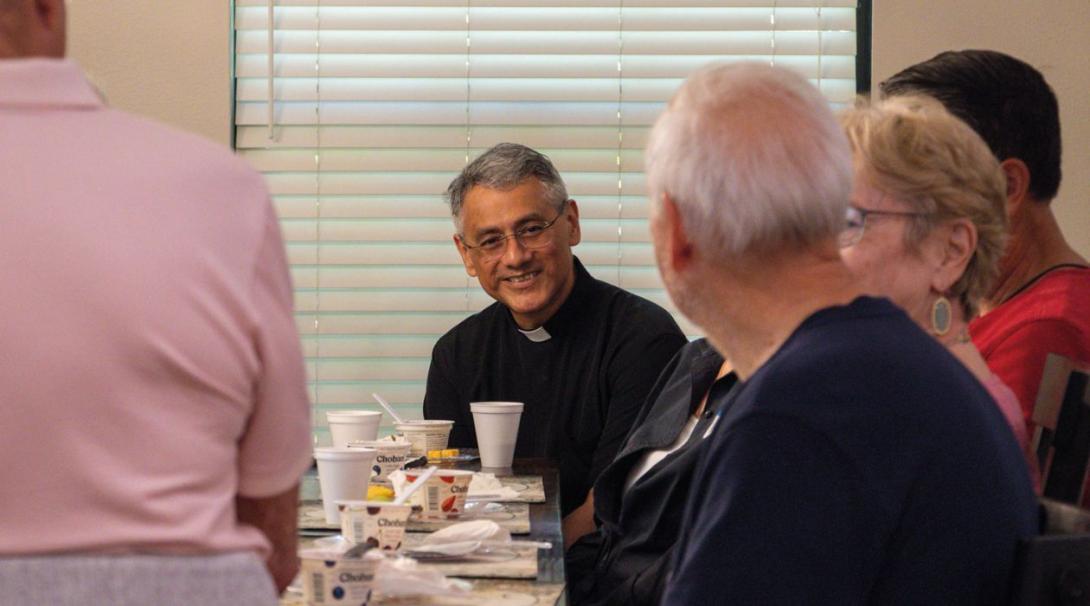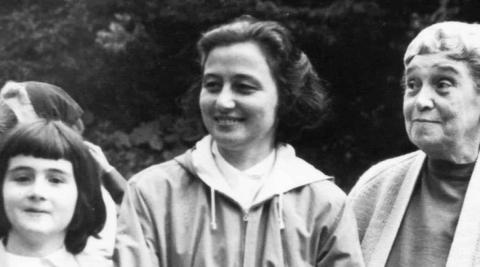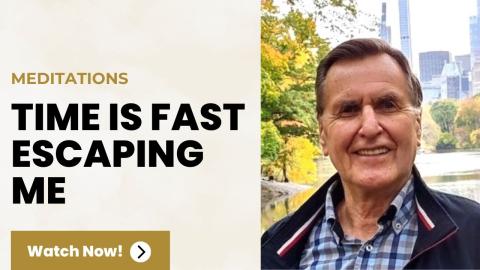“He had been made known to them in the breaking of the bread.” (Lk. 24:35)

Fr Jesse Garcia during one of the "break bread: dinners. Photo courtesy of Fr. Jesse Garcia.
Growing up in the Focolare Movement sensitized me to unity and communion both as a lived experience but also as a path to holiness. On the one hand, the spirituality of unity prompts me to do my part to make unity and communion grow in my parish by, among other things, extroverting myself, engaging others, and bringing out the unity dimension of scripture and Catholic life. On the other hand, unity and communion necessarily require reciprocation of love from others in utmost freedom. In a mega-parish of 25,000 parishioners, that is such a daunting task. Intimacy and connectedness in this parish are certainly mega-challenges.
It is easy to see how some people can become comfortable remaining anonymous to each other. Some of the more active parish members do build deep bonds within their respective ministries. But I think God wants more from us as parishes. I think He wants our overall parish culture to be one of deeper intentional connectedness at every level. Otherwise, faith can remain a private matter even within the parish community. For those who live the spirituality of unity and communion, the whole point is to share and live the faith together very publicly and very intentionally.
The rite of the Mass unites us at the level of worship and that seems to be enough for most people. And yet, worship is giving to God one’s whole being day by day, moment by moment, giving up, sacrificing oneself also for the other. Worship does not end with Mass; indeed, Mass sets the tone for all that happens between one Mass and the next. Furthermore, the Eucharist, in addition to being a real presence of Jesus, is also the sacrament of unity among people. But can we see that unity being lived out in our parish communities?
One of the gifts the Focolare experience offers to everyone is precisely a lived experience of unity, tangibly sustained by an intentional effort to come together and engage each other. I grew up fully immersed in the spirituality of unity, and lived as a lay consecrated Focolare member for twenty-seven years. Having felt the vocation to the priesthood, I followed this new call and was eventually ordained for the Archdiocese of Galveston-Houston. Since my first assignment ten years ago, I have been determined to do my part in whatever parish God put me to sensitize people to the essentialness of being intentional in building bonds of unity and communion.
My previous assignment was at a parish of 2,400 parishioners. There, I met a couple named Barbara and Baltasar who had been in a parish of 36,000 parishioners. They had grown weary of the fact that few if any fellow Mass attendees made an intentional effort to really get to know each other and build deeper bonds. They were determined to effect some change. They got the idea to randomly invite parishioners they met at Mass to dinner. The reactions they got at their invitations were symptomatic perhaps of the individualized culture that pervades us: “Why?” they were asked; “To get to know you” was their response. Again, the question, “Why?”
The purpose of the dinners was genuinely only to get to know one another
People were suspicious, convinced there had to be a catch or some ulterior motive for the invitation. To people’s surprise, there were no strings attached. The purpose of the dinners was genuinely only to get to know one another. The dinners grew to such a point that people were looking forward to the next one. And people were invited back on the condition that they would bring a new person with them. Some indicated that their friend or their spouse was not Catholic: “It doesn’t matter.” And what a delight it was for all sorts of people to come together and share a meal and get to know each other.
When Barbara and Baltasar shared this with me, they confirmed an idea that had been brewing within me. Why not use the same concept in my new parish to bring people to my home, sit them at the table to have a meal, and have each one share God’s story in their lives? It would be a moment to recognize the golden thread of God’s design. Barbara and Baltasar committed to helping me get this going.
There were obstacles to overcome. The main one was practical. The priest house was not adequate for hosting a group of people for a meal, but I was able to raise enough funds to get the priest house renovated. We tore down several walls, and I had a 9-foot by 9-foot table custom-made where 16 people could sit down at the same time, see each other, talk and listen to each other.
In the meantime, Barbara and Baltasar set up a tent in front of the church to sign people up to “break bread with Fr. Jesse.” They did this for seven consecutive Sundays and managed to sign up 3,000 people! They recruited volunteers to be hosts for these meals, and even came up with a cost-effective standardized meal plan. Then, an online signup process was established so that these 3,000 people could sign up to join any one of the three breaking bread meals during each Sunday that would start the following month.
January 13, 2024 was the day of the first breaking bread meals. Many said they didn’t even know the priest house was on parish grounds. Many others said they had never been inside a priest house. At the meal, I gave an introduction reiterating that the sole purpose of coming together was not only for me as a priest and pastor to get to know them, but equally important was for them to get to know one another. I was not going to ask them for money, nor ask them to volunteer for anything. We blessed the food and the sharing commenced.
Everybody had a story to tell, even me. Most people walked into the house as strangers and left with new bonds of fraternity formed. The experience is especially enriching for those who volunteer to be hosts for these meals, which include welcoming people at the door, having them make a name tag, arranging each plate with food, setting each plate on the table, sitting in on the conversation while serving drinks, and picking up afterwards. So far, 90 people have signed up as volunteer hosts.
At the end of each meal, I make a brief video showing the face and name tag of each one present, and then we take a group photo. I send the video and group photo to each member of the group by email so that they don’t forget each other, and it also helps me refresh my memory. Smiles and giddiness are everywhere at each meal. Gratitude and joy are abundant.
It has been several months now since the meals have been going on. People leave with a new sense of connectedness. It is a Eucharistic experience not only focused on the true presence of Jesus in the sacrament, but on what the Eucharist does, that is, among other things, nourishes the presence of Jesus among us such that we experience what the disciples experienced after the road to Emmaus where Jesus stayed with them to share a meal, and they recognized him in the breaking of the bread (cf. Lk. 24:30-31), and they reminisced: “Were not our hearts burning within us while he was talking to us on the road, while he was opening the scriptures to us?” (Lk. 24:32)
During these meals, as people share sufferings and joys, I remind them that when we share our sufferings, they are divided among us and are easier to carry. When we share our joys, they are multiplied among us. Each one feels free to share with the others the wisdom they’ve acquired in their journey of faith. Some who only knew the other casually are pleasantly surprised to discover similarities in life. Each story is fascinating and unique, but in the end, it is a glimpse of how God’s love directs all our lives, also mine, and we experience the oneness we so often mention during the liturgy of the Mass. When I see persons who have been at one of the meals, they tell with much delight: “We saw some of our breaking bread family at mass today.” I see this parish of 25,000 people and myself being transformed one meal at a time.












